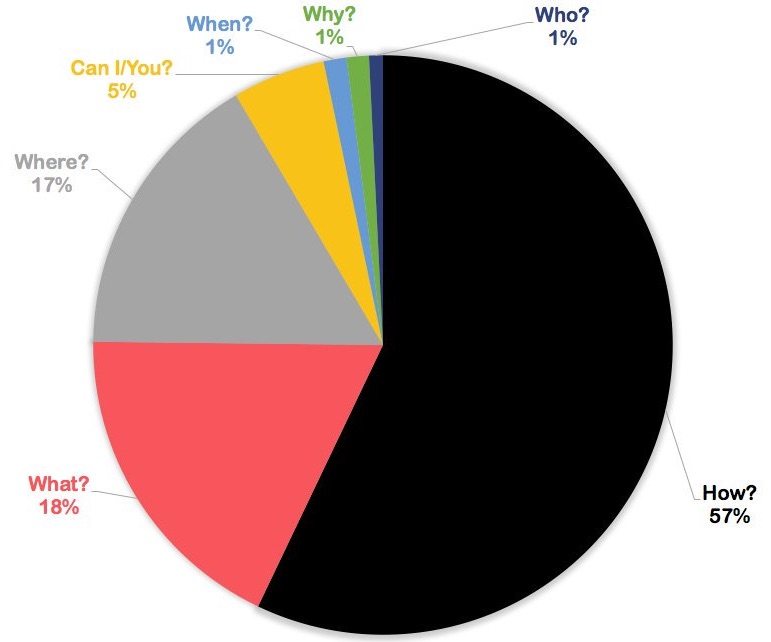You’ve probably heard a lot about Voice Search by now. Percentages, stats and predictions about the rise of voice-enabled devices. Let’s ignore that for a moment and discuss the practicalities…

Firstly, let’s all calm down.
No, Voice Search is not going to change the world as we know it. But yes, it does have an impact.
Voice Search on mobile phones has been around for many years. It’s voice assistants such as Google Home and Amazon Echo that are now causing more and more people to pay attention.
It’s likely that voice search on assistants will not be saturated by shorter commercial searches like “Cheapest iPhones” for some time.
Mobile and desktop will still be used to actually see a product, engage with product photos and video, compare price and satisfy the need to read more.
And also, Voice Search is just not built for that type of query because it must be seen as impartial.
Voice Search on assistants lends itself well to research-driven queries. For that reason, it’s more likely to receive and satisfy a query like “Which version of the iPhone can… do X?”
“What is important”
The instant gratification of getting the right answer to a question on these devices will rarely, for now anyway, lead to a direct sale.
What is important though, is positioning yourself as the one who’s best able to answer these questions, primarily through Rich Snippets.
Voice Search on assistants, otherwise known as “eyes-free”, is at present most effective for those interacting with apps, making calls, home automation, playing music, solving a problem, just seeking an answer to a general question, and much more.
Hell, some people may even just be using it to settle a bet or just have a bit of fun!
So some of the more popular voice searches are for things such as finding a location, instructional content like “How do I remove my HUAWEI Mate 10 Pro battery?”, basic information like “How do I find the number for…?” and endless random queries like “How old is Liam Neeson?” … and much more.
Just for the record, sometimes Google Home is wrong – Liam Neeson is immortal.
If it helps, we also recently analysed over 83,000 voice searches on Google to give a steer on this. People seem hesitant to ask Google about the ‘Who’, ‘Why’ and ‘When’…

“There is a ‘Needs Met’ Rating”
One thing that most articles seem to ignore is that Google themselves have recently published guidelines on this (keep reading for the link), and they’re surprisingly straight-forward. There is a “Needs Met Rating”.
This is similar to how they already factor in dwell-time; in other words, how long a user stays on your website to consume your content as opposed to hitting the back button and returning to the search results.
So, basically: is the user happy with the answer that Google has given them? Has it met their needs?
It’s simple: Google doesn’t want to give shitty voice answers. Unlike traditional search whereby the answer ultimately comes from your website, this is being delivered as if from Google themselves – they really don’t want to mess this one up.
“Consider this when you write content”
So what answers do they like to use?
Very importantly, they take into account the length of a worded audio response. If it’s long enough to satisfy a query, then it’s likely you’ll score high. Consider this when you write content with voice search in mind – or any content, for that matter.
This does not mean that longer is better. Don’t elaborate too much in your response to a short, succinct question and don’t be too concise for a query that needs a more detailed answer.
Grammar is also taken into account. As with any content, this will be seen by Google’s algorithm as lazy and of low quality, and therefore less likely to be chosen as the best response.
“Some Initial Steps”
If you’re wondering how to dip your toes in the water here, let’s suggest some initial steps.
- First, take a look first at your website’s blog, FAQ and support content. Is the correct markup in place so that it can also be used in response to a voice search?
- Do your product pages contain content that references the solutions you provide to a user’s problem? This is not a new concept. It should address any queries or concerns that users have about what you offer, even about your sector. It could also call out the nice benefits of what you provide – how will it make their lives easier or better?
- Have you spoken to the frontline of your customer support? Or, those who best understand the queries that people have about your product, service or even broad queries relevant to your sector? This can help you to formulate content that answers these questions.
- Keep your content as non-biased and non-commercial as you can. Google Home is unlikely to use your answer if it says “We are the best because…”
- Lastly, and it’s tougher than it sounds, just put yourself in the mindset of someone who has a voice assistant. What would YOU realistically use it for? What kind of answers would YOU be satisfied with?
“Eyes-free” devices will also take into consideration a user’s location, time of day, their own preferences, search history and more. It has much of this in common with mobile and some desktop searches. Location is important because “near me” searches are on the rise due to users assuming that their location is a given.
“You need to be cautious”
Approaches to optimising for voice search will differ depending on your product, sector, offering, and geographic location. But first and foremost, take a read of what Google themselves have to say here and really let the examples sink in.
And remember: like search in general, you don’t want to over-do it. Google has stated that you need to be cautious about rushing out to create tonnes of single-page Q&As to try and dominate voice search. Don’t do it, it’ll be too obvious.
So, there you have it.
If you want to know what impact Voice Search may have on your business then get in touch and we’d be glad to chat.
